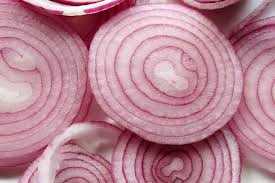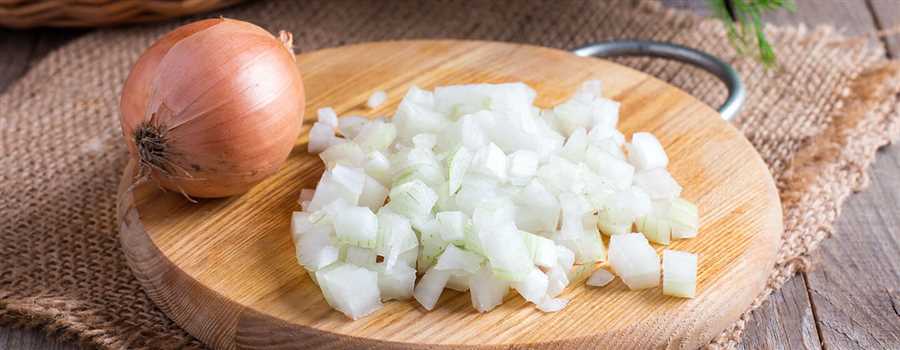Onions are a popular ingredient in many dishes, adding flavor and aroma to meals. However, while onions may be a tasty addition for humans, pet owners should be cautious when it comes to feeding onions to their dogs.
Raw onions contain a substance called thiosulphate which is toxic to dogs and can cause hemolytic anemia. This is a condition where the red blood cells are broken down faster than they can be produced, leading to a variety of symptoms such as weakness, lethargy, vomiting, and pale gums.
But what about cooked onions? Some pet owners may wonder if cooking onions makes them safe for dogs. Unfortunately, cooking the onions does not remove the toxic substance. Thiosulphate remains present in cooked onions and can still be harmful to dogs.
It is essential to be aware of the risks associated with feeding onions to dogs and to keep them away from any dishes that contain onions, whether raw or cooked. If you suspect that your dog has ingested onions or is displaying any symptoms of anemia, it is vital to seek veterinary care immediately to ensure their well-being and recovery.
Can Dogs Eat Cooked Onion
Onion is a common ingredient found in various human dishes. However, it is important to note that onions can be harmful to dogs, whether they are raw or cooked. While some foods that are safe for humans may not be safe for dogs due to their different digestive systems, onions, in particular, can be toxic to dogs.
Onions contain a compound called thiosulfate, which is toxic to dogs. When dogs consume onions, this compound can cause damage to their red blood cells, leading to a condition called hemolytic anemia. The severity of the symptoms depends on the amount of onion ingested and the size of the dog.
Health Risks for Dogs
If a dog consumes a small amount of onion, they may experience symptoms such as vomiting, diarrhea, and stomach pain. These symptoms are usually mild and can be treated with supportive care. However, if a dog ingests a large amount of onion, they may develop more serious symptoms, including weakness, rapid breathing, pale gums, and collapse. In severe cases, onion toxicity can be fatal for dogs.
Prevention and Treatment

To protect your dog from onion toxicity, it is best to avoid feeding them any foods that contain onions, including cooked onions. This includes dishes like onion soup, onion rings, and stir-fried dishes with onions. It is also important to be cautious of onion powder and other onion-based seasonings, as they can be found in various processed foods.
If you suspect that your dog has ingested onions or is showing symptoms of onion toxicity, it is crucial to seek veterinary care immediately. The veterinarian may induce vomiting to remove the onions from the dog’s stomach or administer treatments to support the dog’s red blood cell function.
In conclusion, dogs should not eat cooked onion or any form of onion due to their potential toxicity. It is essential for dog owners to be aware of the risks and prevent their dogs from consuming onions to ensure their health and well-being.
What Foods Are Toxic to Dogs

As a responsible dog owner, it is important to be aware of the foods that can be harmful to your furry friend. While many foods that are safe for humans can also be safe for dogs, there are some common items that can be toxic to dogs and should be avoided.
1. Chocolate
Chocolate contains a substance called theobromine, which dogs are unable to metabolize effectively. Even small amounts of chocolate can cause symptoms such as vomiting, diarrhea, rapid breathing, and even seizures. Dark chocolate and cocoa powder are especially dangerous.
2. Grapes and Raisins
Grapes and raisins can cause kidney failure in dogs. The exact substance in grapes and raisins that is toxic to dogs is not yet known, but even a small amount can lead to serious health problems. Symptoms may include vomiting, lethargy, and a decrease in appetite.
3. Onions and Garlic
Onions and garlic, both cooked and raw, contain substances that can damage a dog’s red blood cells, leading to anemia. These vegetables can cause symptoms such as weakness, vomiting, breathlessness, and pale gums. It is best to avoid feeding your dog any foods that contain onions or garlic.
4. Xylitol
Xylitol is a sweetener commonly found in sugar-free gum, candies, and baked goods. In dogs, it can cause a rapid release of insulin, leading to a sudden drop in blood sugar levels. This can result in symptoms such as vomiting, loss of coordination, and even seizures.
5. Alcohol
Alcohol, whether in the form of beer, wine, or spirits, should never be given to dogs. Dogs are more sensitive to the effects of alcohol than humans, and even small amounts can cause dangerous symptoms such as vomiting, loss of coordination, and respiratory distress.
It is important to note that this list is not exhaustive, and there may be other foods that can be toxic to dogs. If you suspect that your dog has eaten something toxic, it is recommended to contact a veterinarian immediately. Remember to always be cautious with the foods you give to your furry friend to ensure their health and well-being.
The Dangers of Onion for Dogs
Onions are a common ingredient in many human dishes and are often used as seasoning. However, they can be extremely toxic to dogs. Even a small amount of onion can be harmful and may lead to serious health issues for your furry friend.
The toxic properties of onions are attributed to a substance called thiosulphate. Dogs lack the necessary enzyme to digest this compound, which results in the formation of reactive oxidants that can cause damage to red blood cells. This condition is known as hemolytic anemia.
Symptoms of onion poisoning may not appear immediately and can vary depending on the size of the dog and the amount of onion consumed. However, some common signs to watch out for include:
- Vomiting
- Diarrhea
- Loss of appetite
- Weakness
- Abdominal pain
- Pale gums
- Rapid breathing
If you suspect your dog has ingested onion, it is important to seek veterinary assistance right away. The veterinarian may induce vomiting or perform other necessary procedures to prevent further absorption of the toxins. Treatment may also include fluid therapy and blood transfusions to counteract the effects of the anemia.
Prevention is key when it comes to keeping your dog safe from onion poisoning. Make sure to keep onions and any dishes containing onion out of your dog’s reach. Be cautious of foods such as onion rings, onion soup, and even baby food that may contain onion powder.
In conclusion, it is best to avoid feeding your dog cooked onion or any food products that contain onion. While a small amount of onion may not be immediately life-threatening, it is always better to be safe and prevent your dog from ingesting this toxic substance.
Symptoms of Onion Poisoning in Dogs
Onion poisoning in dogs, also known as Allium toxicity, can occur when dogs consume a significant amount of onions or foods containing onions. Onions contain a substance called thiosulfate, which is toxic to dogs. The following are common symptoms of onion poisoning in dogs:
- Gastrointestinal upset: Dogs may experience vomiting, diarrhea, and abdominal pain after consuming onions. These symptoms typically occur within a few hours of ingestion.
- Weakness and fatigue: Dogs with onion poisoning may become lethargic and weak. They may have a decreased appetite and show signs of dehydration.
- Labored breathing: Some dogs may develop respiratory issues, such as rapid breathing or difficulty breathing, as a result of onion toxicity.
- Reddish or brownish urine: Onions can cause oxidative damage to red blood cells, leading to the presence of discolored urine in affected dogs.
- Pale gums: Dogs may have pale gums due to decreased oxygen-carrying capacity of the blood caused by onion poisoning.
If you suspect that your dog has consumed onions and is displaying any of these symptoms, it is important to seek veterinary care immediately. Prompt treatment can help reduce the severity of the poisoning and prevent further complications.
Treatment for Onion Toxicity in Dogs
If your dog has ingested onions or is showing signs of onion toxicity, it is important to seek veterinary care immediately. The treatment for onion toxicity in dogs typically involves inducing vomiting to remove any remaining onion from the stomach. In some cases, activated charcoal may be administered to help absorb the toxins and prevent further absorption into the bloodstream.
Your vet may also recommend supportive care measures, such as providing intravenous fluids to maintain hydration and flush out the system. Medications to support organ function and control symptoms may also be prescribed.
Monitoring your dog’s condition closely is vital during the treatment process. Blood tests may be performed to assess organ function and overall health. It is important to follow your vet’s instructions and provide any necessary follow-up care.
Prevention is key in avoiding onion toxicity in dogs. Ensure that all onions and onion-containing foods are kept out of your dog’s reach. If you suspect your dog has ingested onions, contact your vet immediately for proper guidance and treatment.
Question-answer
Can dogs eat any form of onion?
No, dogs should not eat any form of onion as it is toxic to them.
Why is onion toxic to dogs?
Onions contain a substance called thiosulphate which can cause a condition called hemolytic anemia in dogs. This condition destroys their red blood cells and can be life-threatening.
What are the symptoms of onion poisoning in dogs?
The symptoms of onion poisoning in dogs include vomiting, diarrhea, abdominal pain, weakness, lethargy, pale gums, elevated heart rate, and difficulty breathing. If you suspect your dog has ingested onion, it is important to seek veterinary attention immediately.
What if my dog accidentally ate a small amount of cooked onion?
Even a small amount of cooked onion can be harmful to dogs, so it is best to monitor your dog closely and contact your vet for further advice. They may recommend inducing vomiting or providing supportive care to help your dog recover.
Can onions be used in dog food?
No, onions should not be used in dog food as they are toxic to dogs. It is important to read the ingredients of dog food carefully to ensure it does not contain any onion or onion powder.
Is it safe for dogs to eat cooked onion?
No, cooked onion is not safe for dogs to eat. Onions contain a substance called thiosulphate, which is toxic to dogs and can cause a condition called hemolytic anemia.
What happens if my dog eats cooked onion?
If your dog eats cooked onion, it can cause symptoms such as vomiting, diarrhea, weakness, and pale gums. In severe cases, it can even lead to damage to the dog’s red blood cells and could be life-threatening.







